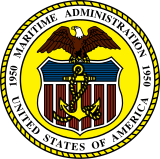United States Maritime Administration
 Seal | |
| Agency overview | |
|---|---|
| Formed | May 24, 1950 |
| Preceding agency | |
| Headquarters | Washington, D.C. |
| Agency executive |
|
| Parent agency | Department of Transportation |
| Website | www.marad.dot.gov |
The United States Maritime Administration (MARAD) is an agency of the United States Department of Transportation that maintains the National Defense Reserve Fleet (NDRF) as a ready source of ships for use during national emergencies, and assists the NDRF in fulfilling its role as the nation's fourth arm of defense, logistically supporting the military when needed.
David T. Matsuda was sworn as the Maritime Administrator on June 25, 2010. The Administrator is also the Chairperson of the Maritime Subsidy Board, Commandant of the United States Maritime Service, and Director of the National Shipping Authority.
History
When the United States Maritime Commission was abolished on 24 May 1950, its functions were split between the Federal Maritime Board which was responsible for regulating shipping and awarding subsidies for construction and operation of merchant vessels, and Maritime Administration, which was responsible for administering subsidy programs, maintaining the national defense reserve merchant fleet, and operating the United States Merchant Marine Academy.
In 1961, the Federal Maritime Board regulatory functions were assumed by the newly created Federal Maritime Commission, while the subsidy functions were assigned to the Maritime Subsidy Board of the Maritime Administration.
On August 6, 1981, MARAD came under control of the Department of Transportation thereby bringing all transportation programs under one cabinet-level department.
Functions
MARAD administers financial programs to develop, promote, and operate the US Maritime Service and the US Merchant Marine; determines services and routes necessary to develop and maintain American foreign commerce and requirements of ships necessary to provide adequate service on such routes; conducts research and development activities in the maritime field; regulates the transfer of US documented vessels to foreign registries; maintains equipment, shipyard facilities, and reserve fleets of Government-owned ships essential for national defense.
Leadership
David Matsuda, Maritime Administrator
K. Denise Rucker Krepp, Chief Counsel
Cheron Wicker, Director, Congressional and Public Affairs
Kevin Tokarski, Associate Administrator, National Security
Dr. Sashi Kumar, Acting Superintendent, United States Merchant Marine Academy
Keith Washington, Associate Administrator, Administration
Joseph Byrne, Associate Administrator, Environment and Compliance
H. Keith Lesnick, Associate Administrator, Intermodal System Development
Maritime academies
MARAD operates one federal service maritime academy, and administers a Grant-In-Aid Program for state-operated maritime academies, as follows:
| Classification | Name | Location | Notes |
|---|---|---|---|
| Federal | US Merchant Marine Academy | Kings Point, New York | One of the United States Service academies |
| State | California Maritime Academy | Vallejo, California | A campus of the California State University |
| State | Maine Maritime Academy | Maine | |
| State | Massachusetts Maritime Academy | Massachusetts | |
| State | Great Lakes Maritime Academy | Traverse City, Michigan | A division of Northwestern Michigan College |
| State | SUNY Maritime College | New York | A campus of the State University of New York |
| State | Texas Maritime Academy | Galveston, Texas | A campus of the Texas A&M University System |
Students at these academies can graduate with appropriate United States Coast Guard licenses (Mate or Engineer)if they choose to take the Coast Guard License exam, and may become commissioned reserve officers in any branch of the service when graduating from USMMA or a ROTC scholarship from one of the other maritime schools.
Subsidies
The Maritime Subsidy Board negotiates contracts for ship construction and grants operating-differential subsidies to shipping companies.
Maritime Security Program
The Maritime Administrator is vested with the residual powers of the Director of the National Shipping Authority, which was established in 1951 to organize and direct emergency merchant marine operations.
The Maritime Security Program (MSP) authorizes MARAD to enter into contracts with U.S.-flag commercial ship owners to provide service during times of war or national emergencies. As of 2007, 10 companies have signed contracts providing the MSP with a reserve of 60 cargo vessels.[1]
Past leadership
Sean Connaughton, Administrator and current Virginia Secretary of Transportation
John Jamian, Acting Administrator and former Michigan State Representative
Captain William Schubert, Administrator
Clyde J. Hart, Administrator and former Administrator of Federal Motor Carrier Safety Administration
Albert J. Herberger, Administrator and retired Vice Admiral United States Navy
Captain Warren Lebeck, Administrator
John Gaughan, Administrator, current consultant with SAIC
Samuel Nemirow, Administrator, current Maritime Lawyer
Andrew E. Gibson, Administrator and Assistant Secretary of Commerce for Maritime Affairs, 1969-1972.
See also
{{{inline}}}
- United States Federal Maritime Commission
- United States Merchant Marine, the U.S. merchant shipping fleet.
- United States Maritime Service, a training organization for the U.S. Merchant Marine.
References
- ^ "Maritime Security Program (MSP)". MARAD. Retrieved 2007-08-03.

